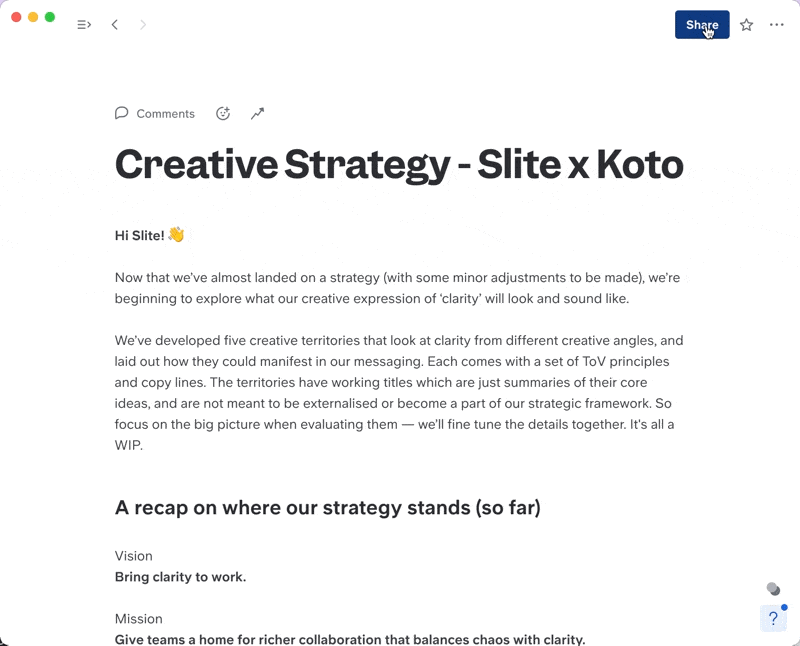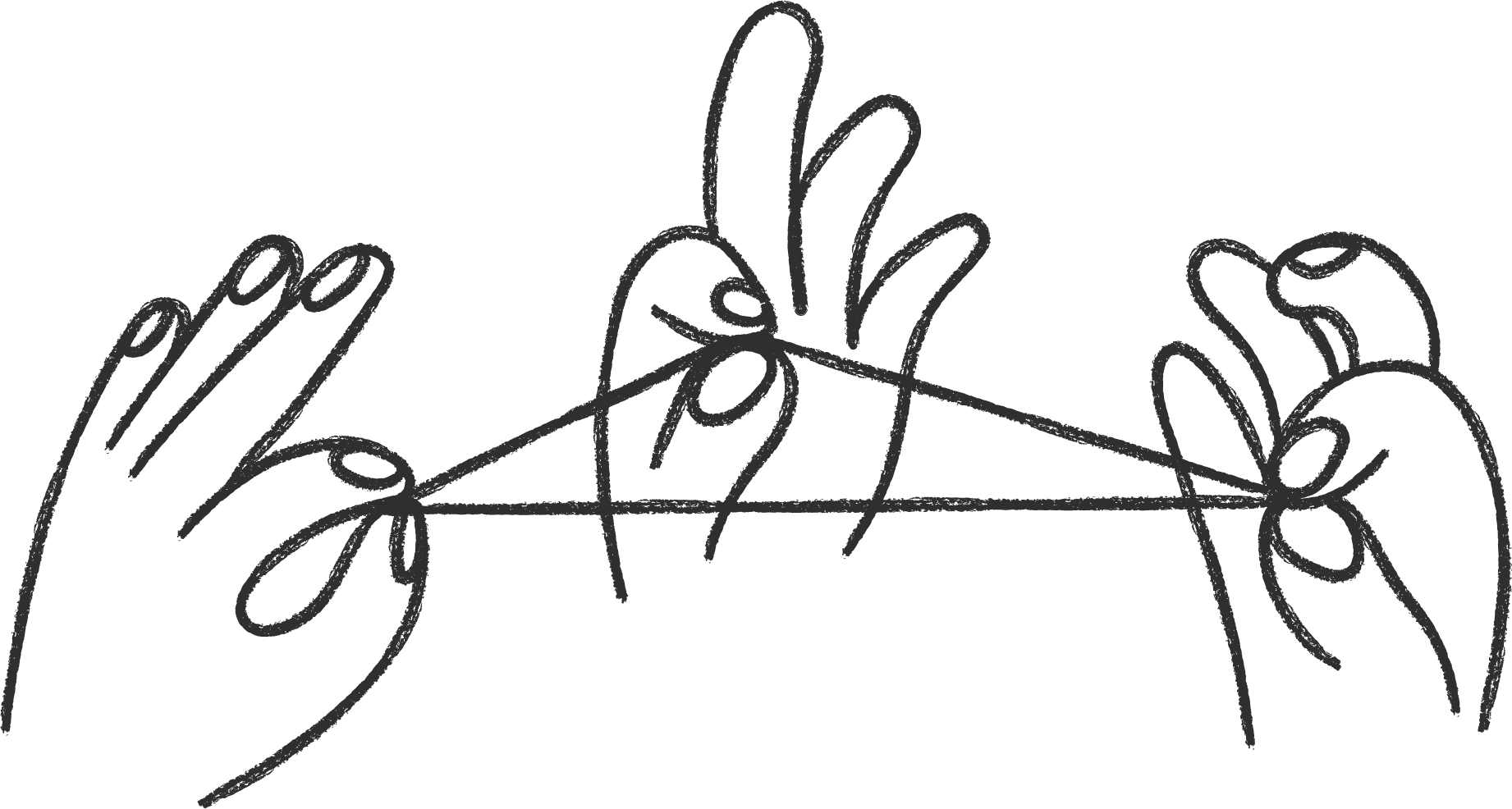Melanie Broder is on the Marketing team at Slite, where she works on all things content. She helps Slite users gain new skills through guides, templates, and videos. She lives in New York City, where she likes to read novels and run loops around Central Park.
As wikis have gained popularity, new types of wikis have evolved for specialized uses. Unlike Wiki Wiki Web or Wikipedia, many corporate wikis are designed only for a small group of people. These internal wikis are kept private. Knowing this, you might ask yourself:
Which type of wiki does my team need right now?
Then, you'll want to think ahead to the future:
When our team grows, will we need a new type of wiki?
The type of wiki you create depends on your team's goals, and how it will be used both now and in the future. Once you set a basic strategy for wiki function and content, you can create your wiki, invite team members, and populate it with documents.
For now, we'll focus on the differences between public and private wikis, and make a case for why an internal wiki is an essential tool for a rapidly growing team.
Does your team need a public wiki or a private wiki?
There are two main types of wikis: private and public. While both are powered by the same technology, they serve very different functions.

Private wikis
Private wikis, or internal wikis, contain your company's proprietary data, knowledge, and expertise. Only employees or invited collaborators are able to access, add, and edit content. They have layers of security that keep sensitive information private.
Private wikis for personal use are simply called personal wikis.
Public wikis
Public, or external, wikis can be accessed by anyone with an internet connection. Wikipedia and similar online encyclopedias fall into the public wiki category. However, public wikis also have professional uses.
In a business context, public wikis can be used for collaboration with outside contributors, such as agencies or contractors. Corporate wikis are also increasingly being used as self-service customer service websites, or helpdesks. When customers run into problems, they can consult the company's public wiki, get FAQs answered, and troubleshoot their own problems. This is a great resource for clients, and cuts down on customer service workloads and wait times.
Who are you writing for?
A wiki is, at its core, a way to communicate information.
If a private wiki is more like a group chat, then a public wiki is more like Twitter. The main difference is audience.
So, ask yourselves:
What is our audience? Who are we writing for?
If the answer is, "Just the members of my team," stick with a private wiki.
A flexible wiki solution: the best of both worlds
Some wiki tools allow for variable permissions - meaning you can control exactly who can access your wiki and who can't. In the case of an agency, for instance, you'll want only the account manager and their team to access your documents. You also want to make sure you're only sharing documents related to the project at hand.
In Slite, the Share permissions are flexible enough to allow you to create private and public documents from the same workspace, so you can collaborate internally and externally.

Ready to start creating your own company wiki? Join Slite for free-->
What are some examples of public and private wikis?
As mentioned above, the type of wiki you create depends on your team goals and wiki content. If corporate wikis generally contain knowledge, than the types of wikis can be sorted by knowledge type.
Here's a further breakdown of wiki types based on the types of knowledge they contain:

Let's explore examples of each.
Examples of Public Wikis
When you create a public wiki for your business, you'll usually have very specific Marketing or Customer Success goals in mind.
Here are two very different examples of public wikis we've created at Slite:
Startup Bibles is a wiki of successful business processes:

And the Slite Help Site answers customer service FAQs:

Public wikis can serve several purposes for your customers, including:
- Education - a wiki can be a learning platform that helps customers gain new skills
- Information - a wiki can be a useful repository of info about your product, company, or industry to help customers learn new facts
- Entertainment - a wiki can be a place to curate obscure, humorous, or thought-provoking material. It's a fun way to build your brand.
A public wiki helps prospects and current users get the most out of your product or service. It also empowers users to troubleshoot problems in their own time.
Example of a Private Wiki

Private internal wikis are used by businesses as internal knowledge bases, handling all company information. Often called a "single source of truth," an internal wiki can organize processes, workflows, HR procedures, projects, people, guidelines, and policies—it's a great resource to have.
Like this example? Download Slite's company handbook template-->
Example of a Personal Wiki

Personal wikis are less common, but you most probably use one—to some extent. It could be something as basic as the notes section on your phone, an organized (or perhaps not so organized) Google Drive set up, or a nifty app. We all need and use personal wiki pages to increase productivity, follow our interests, and make progress in our day-to-day lives.
How will a company wiki help my team reach its goals?
Since you're reading this guide, you're probably looking for a private team wiki solution and steps for creating your company knowledge base.
But wiki creation will be much faster and easier when all stakeholders and team members are excited about the idea of a wiki. Here are some benefits of company wikis that you can explain to your team.
A private wiki keeps everyone aligned
A well-designed wiki can keep everyone on the same page with current and past projects. It enables teams to get a more holistic view of their goals and track KPIs. Check out these free project plan templates to see how to start documenting projects in a wiki.
It aids onboarding
Many businesses use their wiki for onboarding purposes. It can be styled into a welcome pack, giving new employees all of the info they need on company policies, procedures, and people.
A private wiki stores information securely
If your team has individual wikis on the go that are not fit for purpose, you run the risk of leaking sensitive information. A private wiki not only stores all open-source info in one place, but it's functionality also stores it securely—only granting access to those that need it.
It covers all areas of your company
A private wiki doesn't stop at a team or HR. Give your employees the freedom to explore other departments within the company using the wiki and better understand how they can work together.
It is fully customizable
In a business, things change all the time, often rapidly. You need to communicate ideas in new and different ways - like a video!

Your private wiki isn't a static doc; it's continually growing as your company grows and is always a go-to resource for anything new.
It welcomes simultaneous contributions
Have you ever had problems with team members downloading, editing, and re-uploading documents to your team communication tool, and then having multiple versions of the same doc? It can get really messy, really fast. A custom-built wiki allows multiple people to work on a page simultaneously, with no crashes.
It tracks changes made
A private wiki has version control. If you go to a page and something is not there anymore, you can simply revert to an older version and find what you're looking for. In Slite, you can browse a document's history and restore older versions on the go.
Wikis are communication tools
Whether you choose to use a public or private wiki in your team, the main thing to remember is that wikis aid communication. Whether you're looking to onboard new hires, answer customer questions, or update your company strategy, your wiki should always have the goal of clear, open communication in mind. That way, you can truly connect with your colleagues to get your message across.

.png)

.png)
